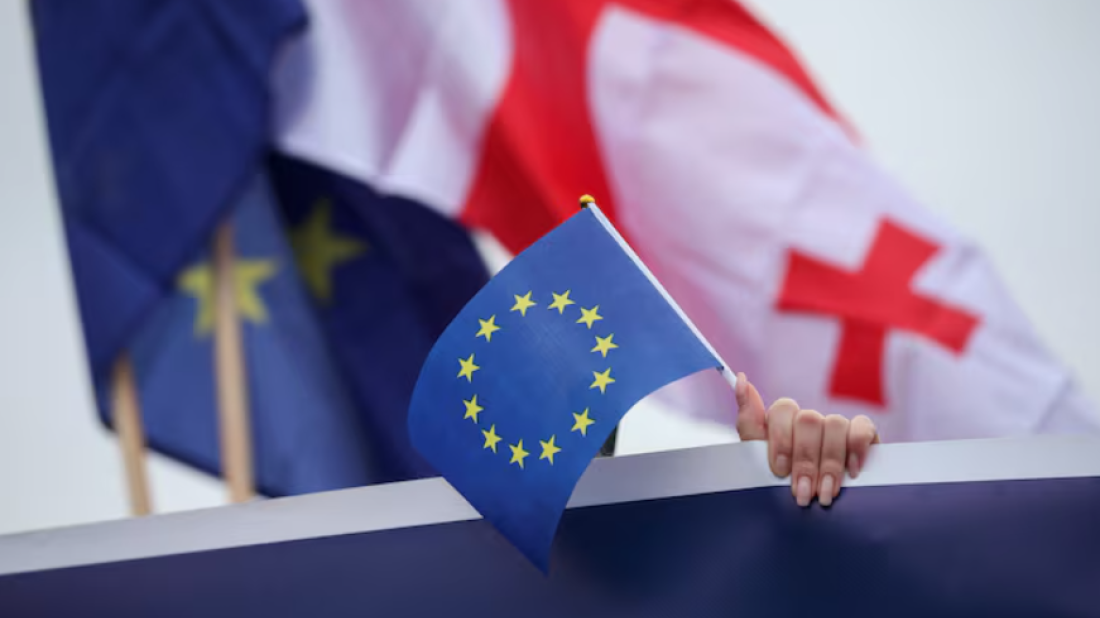Trump says additional talks with Iran expected on Friday
Tensions between the U.S. and Iran are escalating, with Washington ordering a significant military build-up in the region and multiple countries evacu...

Tensions mount as Georgia rejects European Union reform requests tied to its membership candidacy, signalling a new phase of political resistance from Tbilisi.
Georgia’s relationship with the European Union is entering a new phase of confrontation, as Prime Minister Irakli Kobakhidze doubles down on defiant rhetoric in response to growing pressure from Brussels.
At the centre of the standoff is a formal letter from the European Commission, urging the Georgian government to implement eight key reforms critical to maintaining the country’s EU candidacy status.
In a firm response, Kobakhidze made clear that the government will not accept what he described as “political ultimatums.”
He said that if the choice comes down to visa-free travel or maintaining peace and national sovereignty, “Georgia chooses peace.”
“Whether a citizen travels to Europe with or without a visa is not an existential issue. Peace and stability are,” Kobakhidze told reporters.
The European Commission’s recommendations, sent to Foreign Affairs Committee Chair Maka Bochorishvili, call for progress on judicial independence, de-polarization, media freedom, and the reversal of recently adopted laws, including the controversial “foreign influence” legislation. These steps, Brussels insists, are necessary for Georgia to remain on track in its EU accession process.
But the Georgian government continues to frame the pushback as an infringement on its domestic agenda. Kobakhidze argued that the new laws—targeting foreign-funded organizations and promoting “traditional values”—are designed to protect Georgia from what he claims are efforts to undermine national stability.
Ivanishvili, Sanctions, and the "Deep State"
Kobakhidze also brought renewed attention to the Georgian Dream party's honourary chairman and billionaire founder, Bidzina Ivanishvili. In response to fresh speculation in European circles about possible sanctions, the Prime Minister claimed that Ivanishvili has already been targeted informally.
According to Kobakhidze, $2 billion in Ivanishvili’s assets were frozen in a European bank without legal justification— an act he described as “robbery” and politically motivated. He accused the West of acting under the influence of a so-called “Deep State,” saying such actions would have been unthinkable from Europe just decades ago.
“They come out and speak in the language of blackmail,” he said, referring to European institutions.
A Deepening Divide
This latest exchange highlights a growing rift between Tbilisi and Brussels—a relationship once defined by mutual aspirations, now increasingly strained by distrust and diverging political values.
For the EU, Georgia’s democratic development and respect for fundamental rights are non-negotiable cornerstones of its enlargement policy.
For the Georgian government, however, the tone from Brussels is starting to resemble, in their words, “Soviet-style directives.”
The implications are significant. While public support for EU membership remains high among Georgian citizens, the political leadership’s current direction risks further isolating the country from its Western partners. Questions are now being raised in Brussels not only about reform progress—but about the Georgian government’s willingness to stay on a European path at all.
Georgia’s EU candidacy status, visa liberalization, and broader foreign policy orientation are all hanging in the balance.
Tensions between the U.S. and Iran are escalating, with Washington ordering a significant military build-up in the region and multiple countries evacuating diplomatic staff amid fears of further instability.
The death toll from heavy rains and flooding in Brazil’s Minas Gerais state has risen to 46, authorities said, with 21 people still reported missing. The storms triggered landslides and widespread flooding, displacing thousands across Juiz de Fora and Uba.
The situation in Cuba was heating up and called for restraint following a deadly incident involving a Florida-registered speedboat off the coast of the Caribbean island, the Kremlin said on Thursday (26 February).
Venezuela’s Attorney General Tarek William Saab and Ombudsman Alfredo Ruiz tendered their resignations to the National Assembly on Wednesday. Neither official has publicly provided reasons for stepping down.
Pakistani air strikes hit a weapons depot on the western outskirts of Kabul overnight, triggering hours of secondary explosions that rattled homes across the Afghan capital and left residents fearing further violence.
Tensions between the U.S. and Iran are escalating, with Washington ordering a significant military build-up in the region and multiple countries evacuating diplomatic staff amid fears of further instability.
Two people were killed and around 40 injured when a tram derailed in central Milan on Friday (27 Februrary), a spokesperson for local firefighters said.
Colombia’s commerce minister, Diana Marcela Morales, has said she will propose raising tariffs on certain Ecuadorian goods from 30% to 50%, as a trade dispute between the neighbouring countries intensifies.
Former U.S. President Bill Clinton said on Friday (27 February) that he had no knowledge of the crimes committed by Jeffrey Epstein and would not have flown on the late convicted sex offender’s plane had he had any inkling of his activities.
Some of Iran's most highly enriched uranium, close to weapons grade, was stored in an underground area of its nuclear site in Isfahan, the UN nuclear watchdog said in a confidential report sent to member states on Friday (27 February).
You can download the AnewZ application from Play Store and the App Store.

What is your opinion on this topic?
Leave the first comment